Jim McGillivray
(1955 - )
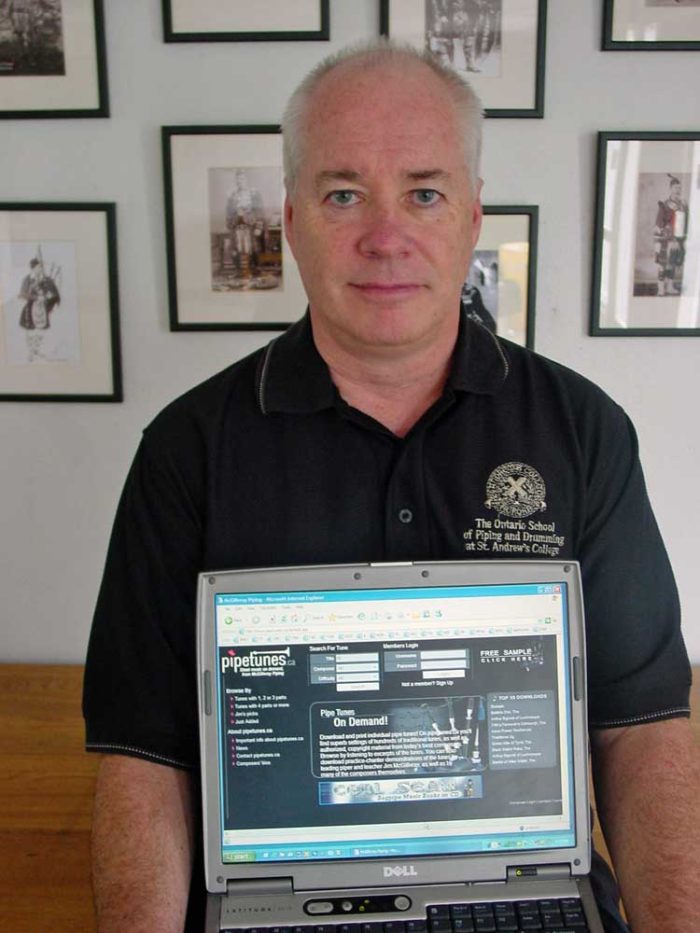
I was born in the city of Kitchener, Ontario to parents of Scottish descent. Neither of my parents was a musician, but my father loved the pipes and we sometimes went to the Highland games, so on a whim at age 11, I decided to learn the pipes.
I began with a legion piper named John McIntyre, a Glasgow man, and started to play with the Branch 50 Kitchener Legion Pipe Band in 1967 under Pipe Major Colin Miller, another Glaswegian. Colin was great with the kids and we were a successful Grade 3 band, winning Ontario Champion Supreme honours two years in a row. However, my commitment to solo piping came after I met Ed Neigh in 1970. I joined Ed’s Guelph Pipe Band and he began to teach me. My formative years as a piper were heavily influenced by Ed, and it is to him that I owe whatever early piping success I had and in many ways the direction my life has taken. He was a tremendous mentor and guide to me for many years.
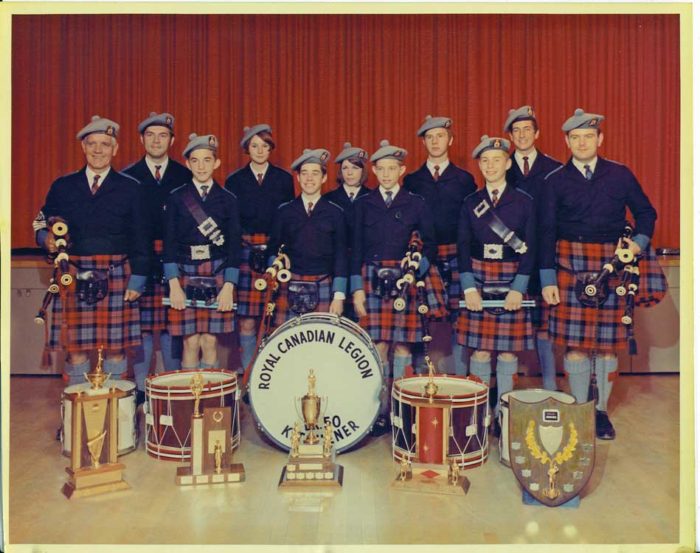
During the 1970s I also went to summer schools with John MacFadyen of Glasgow. John was one of the leading Scottish players during the late 1950s and 1960s. Five years of two-week sessions with John were a major influence in a different sort of way. Ed taught largely by analysis; John taught by force of will.
I enjoyed some gratifying successes quite young on the professional solo scene in Ontario during the 1970s, earning prizes as the top amateur piper at the North American Championships at Maxville, Ontario in 1972. I also won two North American Pipe Band Championships with the Guelph Pipe Band, the final one in 1981, the year I was Pipe Major. I played in the Guelph band from 1970 until 1981, mostly under Ed Neigh, then I felt I needed to commit more time to my solo career.
It was in that year – 1981 – that I began serious competitive forays to Scotland. During this time I was getting help with piobaireachd from Andrew Wright, mostly by tape. I would visit Captain John MacLellan in Edinburgh once in a while during those trips to play some tunes for him. The combination of Andrew’s sense of phrasing and Capt. John’s constant admonitions that the music must have some ‘go’ seemed to be just what I needed at the time. I would also drop in on Bill Livingstone periodically during the winter to run tunes past him, and his common sense and musicality always hit one or two nails on the head. I was quite driven during these years, as any successfuly competitor is. I liked the positive reinforcement of winning prizes, I liked the people I was involved with, and I loved the sound of the instrument.
I was fortunate enough to win more prizes than I’d ever hoped to win during an intense seven-year period in the late 1980s: the Gold Medal at Inverness in 1985, the Clasp at Inverness in 1986, which many consider an unofficial World Championship, the Gold Medal at Oban in 1991, the March/Strathspey and Reel at the Glenfiddich Championship in 1986, and the Strathspey & Reel at Oban in the same year. It seemed like a pretty good run in a fairly short period of time, and while the trips were fun they were a drain in many respects. So I stopped, just like that.
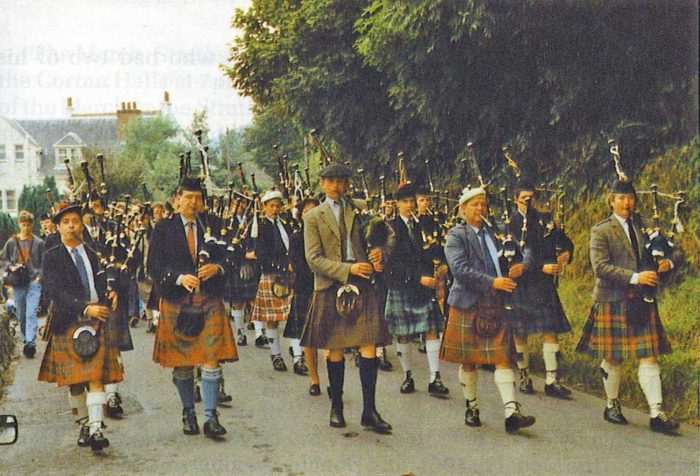
Those Scottish solo pilgrimmages had lasted 10 years. I retired from competing in 1991 at the age of 36 for the simple reason that during all the years I did it I never enjoyed it. In fact, I never realized how much I disliked it until I quit. The pressure I put on myself to play well was enormous and the cost and sacrifices of the Scotland trips in finances and time were difficult to sustain. I envy my colleagues who enjoy competing so much that they have pursued it well into their 50s and 60s, but I was not one of them. Yet I almost certainly owe my playing standard, the depth of my repertoire, and much of my mental toughness to those years of competition. And of course, my natural competitive nature remains.
In 1988 I had a hankering to try out a pipe band again, so I joined the 78th Fraser Highlanders in Toronto and spent five great years with them. My friends were there – Bill Livingstone, Michael Grey, Bruce Gandy, Andrew Berthoff, and later Michael MacDonald and Rob Crabtree – and we were all very creative and very silly, and we laughed until our cheeks hurt. But we were serious about piping, and it was during those years that I wrote my best tunes, some of which have become quite popular on the world stage. I left that band in 1993.
I get my band fix now out of the St. Andrew’s College Pipes & Drums at the independent boys’ school I joined as a full-tme piping teacher in 1998. I teach credit piping courses and run the band as part of the school’s Cadet Corps. We’ve made and brought in some wonderful young players and for me it’s been a tremendous education in teaching and running a band of young men. We are neither a competition band nor a ‘street’ band, but we perform high-profile engagements on a regular basis and produce some pretty grand music in concert situations.
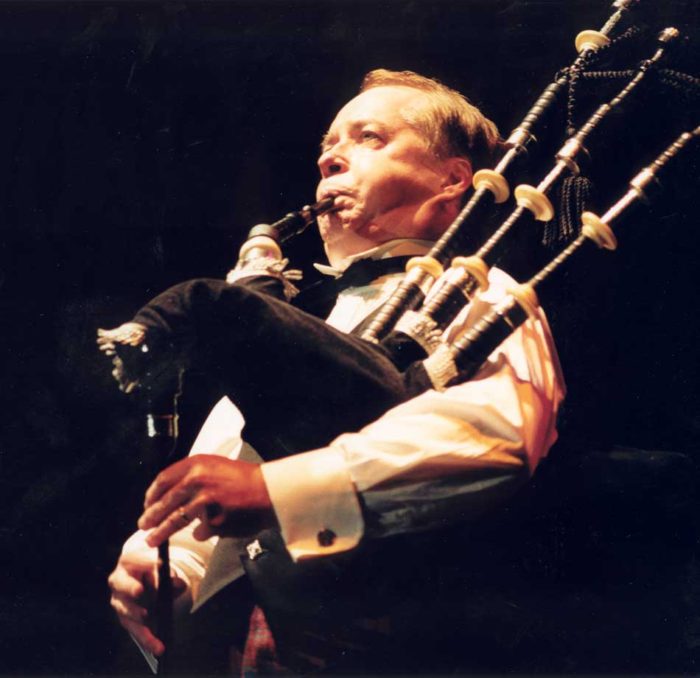
In 1998, I produced Rhythmic Fingerwork, a piping method and exercise book, and to my surprise it became a hit, selling 20,000 up to 2016. A few years later my friend Rob Crabtree and I produced two instructional DVDs, Pipes Ready! and Pipes Up! on maintenance and tuning, respectively. They too have proven popular. During the last 35 years I’ve spent much time travelling to judge, giving workshops and clinics, teaching at summer schools and giving recitals.
My piping took an interesting turn around the year 2000 when I learned how to use a bellows and started to take Scottish Smallpipes, Border Pipes and Northumbrian Smallpipes quite seriously. I’m particularly taken with the latter instrument. It has one of the most beautiful sounds in all music, and a very cheerful repertoire all its own – with no gracenotes! While I would not feel comfortable playing this instrument in public, some of my most enjoyable times are spent alone playing through the traditional Northumbrian smallpipe repertoire with my 16-key Colin Ross chanter and Richard Evans drones.
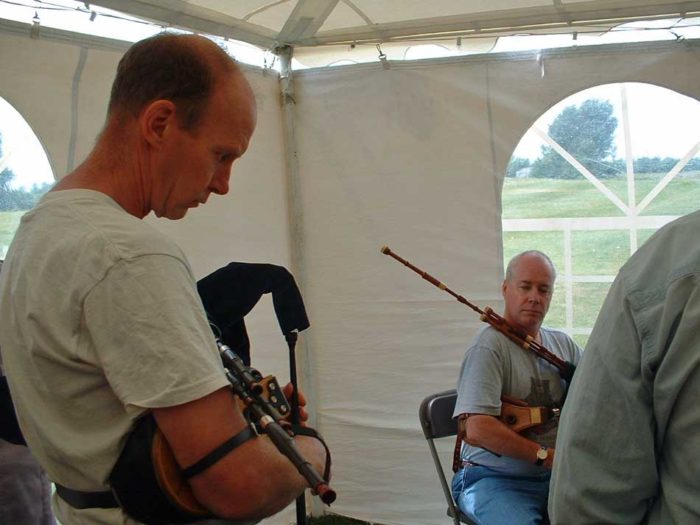
Around that time I also began selling miscellaneous piping supplies and that has now turned into a thriving and vibrant small business called McGillivray Piping Inc. I focus not on CDs, kilts or balls of hemp, but on top-line bagpipes — particularly valuable vintage bagpipes — chanters and reeds, and on providing people with superior instruments set up to play superbly according to their level of experience. That’s what I like doing in my business and that’s what I do best.
The 2008 piping season saw one of the most fun, intense and interesting piping projects I was ever involved with when the concept came about to form the Spirit of Scotland Pipe Band. The idea was simple: get 35-40 leading solo and band players currently unaffiliated with bands to commit to playing at the World Pipe Band Championship. Have them learn the music during the winter, then meet the week before the event for intense practice and see what happened. It had never been done before, and it was an incredible experience, all documented in the feature film On the Day: the Story of the Spirit of Scotland Pipe Band.There were 10 Gold Medallists in the band, and while we never expected to win, we played two superb performances, achieved our goal of qualifying for the final round, had a blast, and were part of a great piping film. I’ll never forget that week and my fellow bandsmen who were involved

My current labour of love is of course pipetunes.ca, which I consider my most exciting project. This is a website where pipers can download individual pieces of sheet music, mostly public domain. I record sound files for each tune. At the time of this writing there are more than 1,600 tunes and recordings on the site, and lots more will come!
I still see my own playing as the most important part of my piping career. I play as much as I can, maintain my personal musicianship at a high level and refuse to play for an audience without being at my best. I live in Aurora, Ontario and have two children, Anne Catherine and Neil James, both much smarter than their father but, alas, neither one of them pipers.
June 2011, updated October 2018

11 Comments
Dear Jim McGillivray, just set up an account. Some months ago I stumbled upon your website while looking up the tunes played in Bremerhaven by the 51st in 1945. There is a video on you tube, as I’m sure you know. Anyway, in the interim I have become completely addicted to pipetunes.ca, and consider it to be the single greatest resource in all of traditional music. And I’m a Francis O’Neill fan from way back. So I had to sign up. Had to. But we have a bit of a problem. I have reasonably workable relative pitch and picked up a few tunes off of your website by ear prior to setting up the account. So what do we do? I will gladly pay you for those tunes. Give me the word. Also, saw the 78th Frasers in Chicago in the 80’s – great band, great arrangements, better than anyone else as far as I could see. Also played a few tunes with the boys in Rare Air – back in the day. Any of this sound familiar? I’ve taken up enough of your time, so I’ll just say thanks a million for your excellent and tremendous contribution to traditional music and culture. All the best, all the time – Michael Stuart Kirkpatrick
Jim As I mentioned,I am an adult learner beginning at age 27 now sixties and made the grade for many years with the Toronto Scottish as a bandsman.Jimmie Thomson took me in hand and I am able to say I am on the verge of a solo career.He has shown me so much…invaluable ! I have one question which has a come down to a real issue for me:doublings. I have heard you play them.I try to snap them but you play them relaxed and bouncy.Notwithstanding hours of your exercises,I am no further ahead. Snappy or relaxed how should I play them.If relaxed what do you do with the second note of the doubling.Do you nail it or keep your fingers light.Does this question make any sense to you. Stewart Gillis.PS They must be small clear but inobtrusive.SCEG.
Sir Jim:
We were born in the same year (“like a bottle of wine, have gotten better with age”). However, I had a “deprived childhood” – lengthly military service but with no music, enough said. Late in life, moving into retirement, I am just considering attempt to learn the pipes. Modest to a fault, I realize will never be a grand master, possibly not even perform in public, but unfounded belief if successful may be a source of personal satisfaction – similar to mountain climbing or running marathon.
Best personal regards, Robert
Hi Jim
I’m not sure if you remember me, I’m Janice Burnett. Daughter of Bill and Georgina Burnett and founders of Burnett’s Scottish Regalia. I have a set of my Dad’s silver and ivory bagpipes. I was wondering if we could have a discussion?
Good morning Jim! I’ve been told by Jeannie Campbell that you will be the source of supply for Canada and the US for her newly released book, “Pipe Bands”. I’d like to get a copy, but it’s an extra big chunk of change to ship from where she is to the US. Hopefully it won’t be quite as expensive to ship from Canada, although I do know it’s a large book. If there is any truth to this rumor, please tell me where to go to order.
Thanks!
Hi John: yes, I will be carrying the book. I don’t have them yet, and it’s not on my website yet: probably in about two weeks. Go to http://www.piping.on.ca and look under “Education.” Cheers, Jim
Our band has recently began playing all embellishments on the first note on the beat. Instead of playing a grip slightly ahead of the beat,the first low g is on the beat. Are other bands doing this? Information is from pipers Dojo. Andrew Douglas is the owner.
Hello Jim. I just wanted to thank you for the prompt delivery of my last order. The chanter reeds that you selected for me are simply spot on, not only for my MacCallum solo chanter but interestingly enough also a circa 1959 or ’60 MacPherson that I recently received. I love the thing, and find myself playing it more and more often.
One question Jim: do you offer band discounts on reeds and if so what quantity would it start at?
Thanks very much,
Mitch
Found your site while looking for photos of vintage R.G.Hardie pipes, then read your Bio.
Born in 1951, I began chanter lessons at age seven, was playing a half size set at 8, then my Grandfather’s old Lauries soon after. In 1961 my Grandfather bought me a new set of R.G.Hardie ivory mounts ($150.00 at that time) which I played until I burned out on competition at age 17. I couldn’t get into playing for fun then and regrettably stopped playing.
Recently I have been listening to pipers on YouTube (Callum Beaumont for one) and the sound of those perfectly tuned drones can take me to that happy place I’d sometimes go to when playing alone in a room with good accoustics all those years ago. I agree with your description of the Hardies being mellow, a bit lighter than the Hendersons and that’s what I liked about them. Most of the pipers in our band played Henderson drones but we all had R.G.Hardie chanters which our instructor considered the best. One other piper in our band played Hardies and hers were half silver and ivory which her parents bought in 1961 as well ($650.00).
Enjoyed reading your info.
All the best.
Maurice